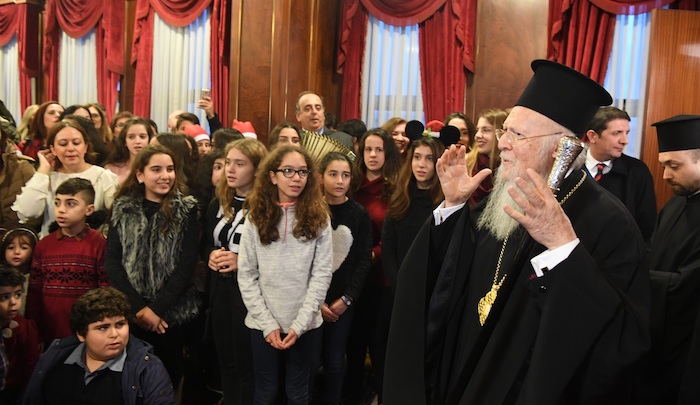The discrimination in Turkey’s educational system is just one aspect of the ongoing plight of the Ecumenical Patriarchate and the remaining Christians in that country. The Turkish government has been for decades pursuing policies that will ultimately end with the extinguishing of Orthodox Christianity in Turkey. We hope and pray that the U.S. State Department will pressure the Turkish government to end these policies, provide for equitable treatment of Christian children in Turkey’s educational system, reopen the Halki seminary, grant property rights to the Ecumenical Patriarchate, and end interference in the elections of the Ecumenical Patriarchs.
Secretary of State Mike Pompeo not long ago reaffirmed the United States’ commitment to protecting the religious freedom of Christians in the Middle East; we urgently request him to make the protection of the Ecumenical Patriarchate and all the Christians of Turkey his top priority.
“Children Bear Witness to Turkey’s Educational Discrimination,” by Claire Evans, International Christian Concern, March 5, 2019:
03/05/2019 Washington D.C. (International Christian Concern) – For Christians living in Turkey, living and sharing their faith is increasingly difficult. Churches are targeted, and forced to exist as “associations” and “foundations” rather than houses of worship. Sometimes, Christians are threatened and discriminated against.
Turkey was once the setting for most of the New Testament. But today, few Christians live there. Instead, culture dictates that Islam is at the core of one’s Turkish identity. For Christians living in Turkey, they face obstacles stemming from a mixture of Islamism and nationalism.
This combination is visible within Turkey’s schools. Christian students may be exempt from Islamic classes, but the exemption is noticed by other students. “Christian students filed a petition to the school, asking to be exempt from religion classes. At the time of the religion lesson, Christian children spend their time in the school library,” explained one Christian parent. What’s more, the schools often enforce nationalism, underscoring a concept which unites Turkish identity with Islamic heritage.
As a mother, Ayse is constantly worried about the discrimination her three daughters face at school in Turkey, even though the girls are cautious. Although Turkey is technically a secular nation, many view Islam as the country’s heritage. As a result, daily life is sometimes challenging for Christians. This pressure often weighs heavily on the children.
“My elder daughter is nine years old and is afraid to explain her belief in school. She doesn’t mention the Gospel, but she says she’s a Christian,” Ayse shared.
Ayse’s youngest daughter, however, continues to publicly discuss her faith at school. “When they ask what her father did for work, she stated that he was a Christian pastor. My little daughter is six years old. She takes every opportunity she can get to share that she is a Christian by singing hymns.”
Her middle child, Sara, is only two years older. Sara has shared with her mother a number of challenges she faces from fellow students because of her Christian faith. Sara said, “My friends are talking to me on one condition. If I don’t tell them about Jesus Christ, they let me talk and play with them. I prefer not to play with them for what they say about me.”
“My friends are talking to me on one condition. If I don’t tell them about Jesus Christ, they let me talk and play with them.”“She has a little Bible and she takes it with her when she goes to school. But her teacher says it’s better if you don’t bring the Bible to school,” Ayse added.
As a mother, Ayse worries about such experiences in school, but she encourages her children to be brave. “As we are parents, we talked with my older daughter, especially because she is afraid to talk to us about these things. We told my daughter that your friends will always love you. When they reject you, they are rejecting Jesus Christ, not you. So, don’t be afraid. Because it has nothing to do with you. We also tell her that in the city we live in, we say there is a respect for Christians. That’s why we don’t need to be afraid of being a Christian.”
Rabia, another parent, has a similar approach with her daughter, Emine, who often experiences rejection and dismissal from her friends when she follows her faith. “As parents, it falls to us to encourage our children. I tell her to pray in the face of this situation. I encourage her to act with love, as Jesus did with those who treated him badly, because there are differences between us,” said Rabia.
One Turkish pastor has repeatedly faced this challenge. His 15-year-old daughter, Ceyda, is in high school and is frequently questioned by her friends and teachers about her Christian faith. “When classes get on the subject of Islam, some try to make a comparison with Christianity and ask me questions. What do you do? Or how do you worship? I give them information about my faith,” said Ceyda.
Sometimes though, the teachers are not open to dialogue. His youngest daughter, Ceyda’s sister, was once brutally beaten by three boys. He recalled, “The teacher was teaching, you know, what the Christians couldn’t do in the crusades, they’re doing now through missionaries – trying to get our land. Three guys, they beat her, and they beat her so bad that she passed out. And an ambulance took her to the hospital.”…







